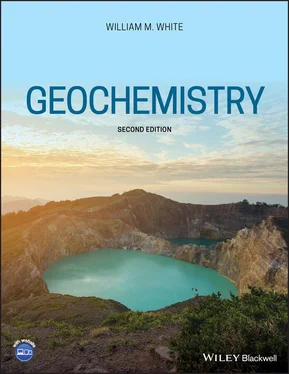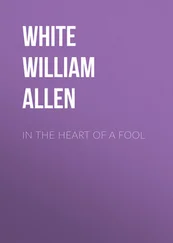The ultimate basis of this book was my notes from geochemistry courses taught by my dissertation advisor, Jean-Guy Schilling. When I first began teaching geochemistry at Cornell, I pulled out those old notes as the starting point. I am grateful for the strong grounding he gave me in geochemistry, particularly in thermodynamic fundamentals. In the first few years, what was to become this book were merely outlined notes handed out to students, which slowly evolved into book form. Once the internet became available, I posted them online, mainly to save myself the trouble of copying and handing them out. Others began to access them as well. I am very grateful to my students over the years for pointing out errors and asking questions that I could not answer, which in turn forced me to research them and expand the book. I am also grateful to my colleagues at Cornell and around the world who have pointed out errors and critiqued the content. This expanded version has been produced in response to their comments and reviews.
One sad lesson I have learned about writing books is that you can never correct all the errors, no matter how many times you proofread. I apologize in advance for errors still present in the book.
July, 2019
Ithaca, New York
About the companion website
Don't forget to visit the companion website for this book:
www.wiley.com/go/white/geochemistry 
There you will find valuable material designed to enhance your learning, including:
Learning outcomes for all chapters
Color version of figures
Exercises for all chapters
References for all chapters
Further reading for all chapters
Scan this QR code to visit the companion website.

Chapter 1 Introduction
1.1 INTRODUCTION
Geochemistry is the chemistry of the natural environment and it encompasses the Earth as well as other Solar System bodies, what Antoine Lavoisier described as “the grand laboratory of nature.” As the etymology of the word implies, the field of geochemistry is somehow a marriage of the fields of chemistry and geology , or more broadly, earth science . But just how are chemistry and geology combined within geochemistry; what is the relationship between them? Perhaps the best explanation would be to state that in geochemistry, we use the tools of chemistry to understand the Earth and how it works . The Earth is part of a closely related family of heavenly bodies, our Solar System, that formed more or less simultaneously. To fully understand the Earth and how it became habitable, we need to understand that formation. Hence, the realm of geochemistry extends beyond the Earth to encompass the entire Solar System.
The term geochemistry was first used by the German-Swiss chemist Christian Friedrich Schönbein ‡in 1838 who wrote, “In a word, a comparative geochemistry ought to be launched, before geognosy can become geology, and before the mystery of the genesis of our planets and their inorganic matter may be revealed.” The goal of geochemistry does indeed address those mysteries, but with one addendum: it addresses organic matter as well because life and its organic products are an integral part of our planet and its evolution. The roots of geochemistry are, however, much older and intimately intertwined with the roots of chemistry, both of which were nurtured in the fertile soil of alchemy and metallurgy (see Morris, 2003). Indeed, Georg Agricola's 1556 treatise on mining and metallurgy, De re metallica , might be considered the first text on geochemistry. A principal goal of alchemy was to transform one substance derived from the Earth into another, such as gold. Even as chemists came to recognize that there were certain fundamental substances, elements, that could not be so transformed and sought to identify them, it was in natural substances that they sought them. However, credit for establishing the modern field of geochemistry is generally given to three individuals: Frank Wigglesworth Clarke (1847−1931), Victor Goldschmidt (1888−1947), and Vladimir Vernadsky (1863−1945). These individuals set the stage for what geochemistry was to become and are collectively known as the fathers of geochemistry.
Frank Clarke received his B.S. in chemistry from Harvard University in 1868 and moved to the newly established Cornell University as an assistant in chemistry in 1869. Though trained as a chemist, his intense interest in geology led him to explore the many gorges and waterfalls in the region and write a guide book about them. Clarke spent most of his career as chief chemist of the US Geological Survey and made a number of remarkable contributions to both chemistry and geochemistry, among other things serving as president of the American Chemical Society in 1901. His classic work The Data of Geochemistry (Clarke, 1906), of which there were several editions, summarized current knowledge of the composition of the Earth and its various components. In addition, he published some 136 papers on topics ranging from the composition of stars, the heat of formation of water from hydrogen and hydroxyl ions, chemical denudation, systematic studies of the chemistry of mineral classes such as micas, silicates, a review of atomic theory and papers on the composition of US rivers and lakes, the composition of igneous rocks and the Earth's crust.
Victor Goldschmidt was born to Jewish parents in Zurich in 1888 and moved to Oslo in 1901 where he received his PhD in mineralogy at the University of Christiania (later Oslo) in 1911. Among his diverse research efforts, he used newly invented X-ray spectrograph to show that the even atomic-numbered rare earth elements (REE) have higher abundances than the odd-numbered ones, a key to nuclear structure. Using the newly invented X-ray diffractometer, he determined the ionic radii of many elements, among other things discovering that the REE atomic radii decreased with atomic number, which he called the lanthanide contraction, which turned out to be a key to atomic electronic structure. He described how the relationships between ionic radius, ionic charge, atomic number, and periodic group, governed substitution of elements in crystal lattices (Goldschmidt, 1937; this will be discussed in Chapter 7). His papers on the formation and differentiation of the Earth foreshadowed modern thinking; he recognized that the cosmic abundances of the elements could best be deduced from meteorites. He used glacial clays to estimate the composition of the continental crust, an estimate that compared well with that of Clarke which was based on a far larger data set. In 1929 Goldschmidt accepted a professorship at the University of Göttingen where, among other things, he published papers on the carbon cycle, pointing out that burning of fossil fuels was increasing the CO 2content of the atmosphere. In 1935, Goldschmidt resigned his professorship in protest of the Nazi anti-Jewish agitation and returned to Oslo, where his work on the abundance of elements led directly to the concept of “magic numbers” of nuclei and the shell theory of nuclear structure (which we will discuss in Chapter 8). He was arrested and sent to a concentration camp by the Nazi occupiers in 1942 but was released soon afterward. He then escaped to Sweden and went on to England in 1943, where he worked with officials involved with the war effort.
Vladimir Vernadsky was born in St. Petersburg to Ukrainian parents. He received his PhD in mineralogy from Moscow University in 1897. Vernadsky was one the first to recognize the significance of radioactive decay as a terrestrial energy source, establishing a Radium Commission in 1909. Vernadsky was active in prerevolution Russian politics and served as a member of the Constitutional Democratic Party in parliament, but he left for Kiev after the Russian Revolution of October 1917 when the Bolsheviks rose to power. There he began the work for which he is best known: biogeochemistry. He argued that life was not independent of its surroundings and was itself a geologic force, both affecting and being affected by the inert world, and introduced the concept of the biosphere (Verndasky, 1926). His viewpoint is very much substantiated by what we have learned since he first espoused it and one critical to our modern view of the Earth. After several years in Paris working with Marie Curie, he returned to Russia to organize the Biogeochemical Laboratory, first in St. Petersburg and later in Moscow. There he led studies of permafrost, mineral resources, and determining the composition of living organisms and the relationship between health and the abundances of elements such as iodine, calcium, and barium in the local environment. He continued his strong interest in radioactivity and isotopes, leading a program for concentration of heavy water and initiating construction of the first cyclotron in the Soviet Union. His efforts led directly to the establishment of a Uranium Commission and indirectly to the Soviet atomic bomb project.
Читать дальше














